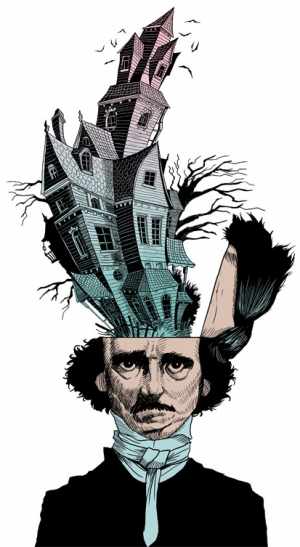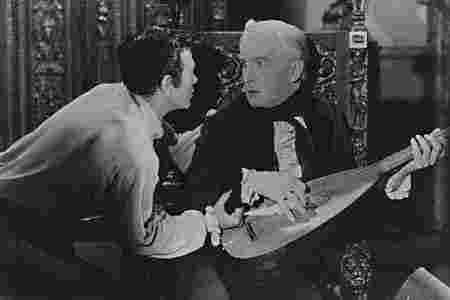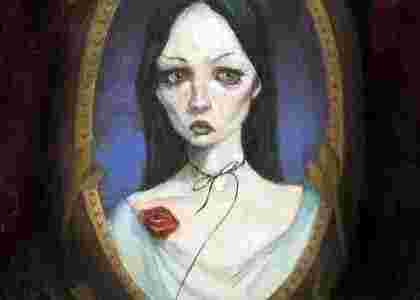The Melancholy of Two Ushers: Into the Mind of Poe

What if you could jump into the mind of the strange and the mentally insane? Think about seeing the world through the eyes of someone deemed irrational or absurd. It is believed by some, that a writer must be just as, if not more, insane than the characters he (or she) creates. This most basically focuses on the method for how a writer is able to create their characters, how they are developed, and how a writer cannot write about things that they have not experience, even in the most abstract of means. The same could be said about a character’s psychological beliefs and that there must be some basis that they were created from. One of the original and most renowned authors for implementing deep psychological aspects is Edgar Allan Poe.
Who is Poe?

Poe was born in Boston and the second son of David Poe Jr., an itinerant actor who died before Poe was three. He was then adopted by the Allan family of Virginia. Young Edgar traveled with the Allans to England in 1815 and attended school in Chelsea. In 1820, he was back in Richmond where he attended the University of Virginia and studied Latin and poetry and also loved to swim and act. However, his school days ended after events involving drinking and gambling and eventually enlisting in the army for two years.
In 1836, her married his thirteen-year-old cousin, Virginia Clemm, and began his writing and editing career, during which he won many awards and publications but also reverted back to his love of drinking. Virginia later died in 1847 and Poe became very unstable. Now living in their last place of residence, a cottage in the Fordham section of the Bronx in New York City, Poe turned to drinking and alcohol more frequently and was purportedly displaying increasingly erratic behavior. Almost a year later Poe became engaged to a wealthy widow, in hopes of turning his luck and fortune around, but he then died two years later after being reacquainted with a group of associates. (Cassil, 1227)

Poe was known for his brilliant writing style, which was influenced by German romanticism and encouraged the usage of Gothic devices. People believed that his own life of debauchery, poverty, and even his gentlemanly mannerism could have been what created the mixture within his style of writing. Some even consider him to be the inventor of the detective story genre with a common theme of having mentally insane killers creating what they believed to be the perfect murder. Poe released various famous short stories that could be categorized as psychological drama such as The Raven, The Tell-Tale Heart, and The Cask of Amontillado long before the genre of ‘psychological drama’ was even invented. So in a manner of speaking, Poe must have had his own share of insanity to be able to create such a diverse spread of psychological characters. Of course, one of Poe’s most intriguing pair of characters comes from his short story, The Fall of the House of Usher.
Meet the Ushers
The Fall of the House of Usher is focused upon an unnamed narrator and his reencounter with Roderick Usher, a childhood friend of the narrator whom claims that he has a desperate illness, and Madeline, Roderick’s precious twin sister. The narrator, therefore, stays with the Ushers in the mysterious and depressing house, which he calls “this mansion of gloom” (Poe, 1228). The narrator mentions how both Roderick and Madeline are the last of their household, which was famous for their dedication to the arts. As the story continues, the narrator falls deeper and deeper down the rabbit hole as he begins to find out more about his friends, the Ushers. What makes this story so interesting is how, like most of Poe’s works, the deep and twisted mentality that is demonstrated in both Roderick and Madeline Usher’s characteristics were developed before the invention of modern human psychological science.
Roderick Usher
The master of the House of Usher, Roderick Usher, holds many similarities to other works of Poe. Roderick, like the protagonist from The Tell-Tale Heart, has what he considers to be extremely acute senses, but taken to even further extremes. In the Tell-Tale Heart, the narrator mentions that he also has an over acuteness of the senses. The tension of constantly hearing the heartbeat of his victim creates a slow insanity within the mind of the narrator as he feels a flow of guilt, breaks down, and confesses to the police of his perfect murder. This story shows the slow development of guilt leading towards further insanity within the mind of the narrator. (Womack, “The Tell-Tale Heart”)
According the Right Diagnosis, hyperesthesia is an increased sensitivity to touch or painful stimuli. (“Hyperesthesia”) Stimuli can be defined as anything that causes a reaction in an organism or part of an organism. Examples of stimuli being: sound, light, or touch; all of which had an effect on Roderick’s personality and explain the dark and messy atmosphere that is the interior of the house.

In Roderick’s case, it manifest physically as if a mental or moral state in which his life is ruled by these senses. (1232) He is able to hear sounds that come from anywhere in the house or the fact of how dark and dreary the house is as it would affect his sight. The narrator describes the scene of the interior,
“Dark draperies hung upon the walls. The general furniture was profuse, comfortless, antique, and tattered. Many books and instruments lay scattered about, but fail to give any vitality to the scene. I felt that I breathed an atmosphere of sorrow. An air of stern, deep, and irredeemable gloom hung over and pervaded all.” (1230)
Roderick is even very sensitive towards what he is able to eat and drink being a bland gruel-like substance. Although Roderick still is able to enjoy some form of the arts as he does enjoy literature as the narrator, or the fact that he has a specially made guitar that he can play and paints.
Therefore, it displays that there is a limitation set upon his own mental laws and fixations as well as exceptions to them as well. These conditions are all relative to two types of mental illnesses: the sensory overload of hyperesthesia and the excessive preoccupation of hypochondria.
Roderick’s other illness, hypochondria (also known as Somatic Symptom Disorder or SSD) is when he has unrealistic worries about his own health. They could be very worried about contracting or currently being in the possession of a disease, with denial towards the acceptance of medical examinations that would say otherwise (“Mental Health”). People with this illness also often seem to misinterpret minor health problems or normal bodily events as a serious disease. This could also explain the letter that was mentioned by the narrator at the beginning of the story as Roderick had requested his attention in his time of great illness and need.

There is also how Roderick seemed to be very sluggish, which is another symptom of SSD that can cause tiredness in some subjects due to the mental strain it takes on their mind.
In a deeper focus of his hypochondria, Roderick’s illnesses could have also created what can be described as a self-fulfilling prophecy. As mentioned previously, Roderick requested the narrator’s presence due to his feeling of illness, however since he has been having his symptoms of hyperesthesia for year now it can be assumed that his sensitivity is not what the letter was referring to. It can even be believed that the letter was relating to an undefinable illness that Roderick mentally created for the sole purpose that he was expected to be ill based upon his own family’s history and background of disease. Another instance happens when Roderick tells the narrator that his sister, Madeline, is dead and how he proceeds to then bury her alive. The reason once again is because Roderick is trying to accomplish his own self-created self-fulfilling prophecy. There are heavy relatable aspects between Roderick and the unnamed main character of The Tell-Tale Heart especially in the aspect of his guilt in trying to kill someone of which they have a close bond to but also affected their psychological quirks, this could also mean that Poe based both of these two characters off somewhat of the same premise.
Madeline Usher

Madeline Usher, the other resident of the House of Usher, was on the other side of the spectrum and is in a far more serious mental and physical state. The reason being because Madeline has been known to fall into cataleptic trances.
“The disease of the lady Madeline had long baffled the skills of her physicians. A settled apathy, a gradual wasting away of the person, and frequent although transient affections of a partially cataleptically character, were the unusual diagnosis.” (1232)
But what is catalepsy? Catalepsy is a mental condition usually indicated by traces or seizures along with a loss of sensation and consciousness. Some of the symptoms of her suffering from catalepsy are: rigid body, rigid limbs, limbs retain position when moved, no response or recognition, loss of voluntary muscle control. All of these symptoms can also be related to a person like Madeline, who is dead or having dead-like experience, even related to the stiffening body symptoms of rigor mortis (“Symptoms of Catalepsy”). This is also what aids in the narrator believing for Roderick’s beliefs of his sister being true, noticing how Madeline’s rosy cheeks which is a sign within a freshly dead body.
A House Without an Usher Cannot Stand
One belief is that Madeline and Roderick are both the same person. This theory can be aided not only by their borderline incestuous relationship, but their closeness in cohabitation. The idea of cohabitation is reflective of the house in itself where both the Ushers and the House of Usher cannot stand if divided into two pieces. (Womack, “The Fall of the House of Usher”.) When the two Ushers pass nearing the end of the story, the narrator sees the mansion as the cracks that were previously visible take over the entire mansion as it sinks into the ground.
“I have before spoken as extending from the roof of the building, in a zigzag direction to the base. While I gazed, this fissure widened- there came a fierce breath of whirlwind- the entire orb of the satellite burst at once upon my sight- my brain reeled as I saw the mighty walls rushing asunder- there was a long tumultuous shouting sound like the voice of a thousand waters –and the deep and dank tarn at my feet closed sullenly and silently over the fragments of the HOUSE OF USHER” (1240).

Poe was very well-versed in attempting to allow his readers to jump into the minds of his characters, however what made The Fall of the House of Usher so unique amongst Poe’s works was that the story was not narrated by the character of whom the lens of psychological study mainly focuses upon. Instead in this tale, Poe used a narrator that was perfectly sane but slowly descend into madness the longer that he stayed within the Usher household. This shows that there is a reflection and more to related to between the reader and the narrator since both are entering into this story with a sane mindset but experiencing the strange on-goings of the Usher’s.
Works Cited
Bausch, Richard, and R. V. Cassill, eds. “Edgar Allan Poe.” The Norton Anthology of Short Fiction. 8th ed. New York City: W.W. Norton, 2015. 1227. Print.
“Hyperesthesia. Symptoms, Diagnosis, Treatments and Causes.” RightDiagonsis.com. N.p., n.d. Web. 06 Oct. 2015.
“Mental Health: Somatic Symptom Disorder.” WebMD. WebMD, n.d. Web. 06 Oct. 2015.
Poe, Edgar Allen. “The Fall of the House of Usher.” The Norton Anthology of Short Fiction. Ed. Richard Bausch and R. V. Cassil. 8th ed. New York City: W.W. Norton, 2015. 1228-240. Print.
“Symptoms of Catalepsy.” RightDiagnosis.com. N.p., n.d. Web. 06 Oct. 2015.
Womack, Martha. “Edgar Allan Poe’s “The Fall of the House of Usher”” The Poe Decoder. Christoffer Nilsson, n.d. Web. 05 Oct. 2015.
Womack, Martha. “Edgar Allan Poe’s ‘The Tell-Tale Heart’” The Poe Decoder. Christoffer Nilsson, n.d. Web. 06 Oct. 2015.
What do you think? Leave a comment.











Thank you Kevin for your interpretation of Poe’s psychological and the physiological conditions within the House of Usher. I will be revisiting this piece with your article in mind. Fortunately, we have progressed within the field of mental health and the more we speak about it in safe and open discussions the better we as a community can understand and act more compassionately with those of us who are on a journey with mental illness.
I completely agree with you! I also thank you for your kind words! ^_^
Usher is great example of how an author such as Poe gets straight to the point.
I couldn’t agree more! Its a very clear and concise-type story.
You need to have a really strong brain to process some of the things in some of Poe’s stories, and you may want to have a little companion (a dictionary) with you since a lot of the words in this story are very complicated.
I agree. A lot of his works use a myriad of different and unique words to help illustrate the scene or the mindset of the characters in Poe’s stories. One of the main thing that a reader must have in order to grasp Poe’s work to the fullest is an understanding of humanity and human psychology.
Well, unfortunately for me, I had no dictionary, but I made inferences into what some the words meant.
Poe was a master at building suspense and drawing the reader deeper and deeper into the gloom and horror he painted with words. The Fall of the House of Usher is a great example of this.
I couldn’t agree more! The amount of detail he puts into the mental anguish of the Ushers as well as the environment only further enhances the mood that Poe sets forth for his readers.
Nothing really happens in his stories.
But that is the interesting part about them! They are so ordinary, yet what makes them so interesting is the language and his use in depicting the environment. Poe isn’t focused much on the telling of a story, rather he is more about making his readers feel something.
Alright! Lovely read. The language is so beautiful and eerie, and the tone is just one of perfect paranoia and fear.
Indeed! It has the very sense of it the moment that you read his very first sentence as the narrator walks coming toward the house. From the beginning we are treated to some of Poe’s darkly vivid depictions of the environment.
The Fall of The House of Usher is one of my favorite Poe pieces. I wrote a paper about it for a Literature class. I like that you tied Poe’s mental state to his characters, and then detailed about the conditions that were mysterious in the story itself. I’ll definitely have to go back and read it again after reading your article. Thanks!
I’m glad you were able to enjoy it! As a writer, I often find myself creating characters and situations based on my mindset. When I look at some characters and stories that writers and screenwriters make, I often find myself wondering “how did they come up with such an amazing character/story.” To paraphrase an old saying “Behind every great character or story is an even greater creative mind.”
Absolutely! It’s incredible that a dozen writers could be given the same premise to write on, and a dozen entirely different stories would be created.
Excellent work. I like the images you picked. As a huge fan of The Fall of the House of Usher, I appreciate the analysis of the Usher twins. Also, good work on explaining Poe’s background.
Thank you! I greatly appreciate your praise of my work! ^_^
How interesting! This is a very intellectual article with some really deep and thought-provoking theories. Poe is one of my favorite authors and poets; I’ll have to go and read this story now with new insight.
I also enjoy many of Poe’s works! I’m glad I was able to give you a new point of view!
This article has answered some ambiguity that I have been experiencing with this story. Establishing Poe’s background and his psychological approach towards his works cleared it up as well. A note that I have wondered pertaining to this story is Usher’s opium consumption. Is there evidence that this was done because of his hypochondria and using that as an excuse to be an addict? I am aware of Poe’s excessive drinking, but he often mentions opiates in his stories. I wonder if the affects of this consumption is emulated through his characters.
I’m happy to know that I could be of assistance! ^_^ As to your opium theory, I feel as though that could possibly be the case. Due to opium being a consistent mention in his works along with mental illness, it could be possible that they have a connection to Poe where it may be that he had experimented with the drug around the same time as his drinking.
Hey Kevin,
Yes! My thoughts exactly. There is much to be explored from Poe’s works. Outstanding synopsis by your hand, by the way. It is just the article that ignites the intuitive thinking behind his genius, and you elaborated it well.
Poe is a master of his craft.
Edgar Allan Poe sure did write some weird stories but for some reason I’ve always taken a liking to his stuff.
I love gothic horror, and this short story has it all. It’s beautifully evocative… “Sickening of the heart”
Easily the greatest, lesser-known story of Poe’s.
Although I haven’t read this particular story of Poe’s, I have read “Masque of the Red Death” and “The Telltale Heart.” Its incredible how many words Poe invests simply in sensory description. In this story and the telltale heart it takes the form of hyperesthesia and in the long descriptions of sounds, and Masque of the Red Death sees Poe describing a series of different rooms, each with a very different and detailed hue.
I love Poe. He draws the reader in with imagistic writing and great atmosphere.
I love Edgar Allan Poe. Probably more than most. Thus, I love “The Fall of the House of Usher.”
Poe has a class that no other writer can match.
Poe implements the idea of “single effect” flawlessly, and this story lends itself to a great discussion about the darkness of man’s mind.
The fall of the House of Usher is more literal than I thought it would be.
I read the first few pages of describing the house of Usher more than ten times in the past two years before deciding to read the whole story.
A story of postponement.
I love the way Poe writes, very scary.
I had to read this again since it was in revisions, and it impresses me more about the ideas that can still be drawn from his stories. The peculiar nature of his work is rather hard to appreciate unless you piece together the insanity in it, and then it will make sense. I love reading the various interpretations, and this article did a great job of it. Unfortunately I cannot make any suggestions or criticisms to this particular work, as I never had the opportunity to finish reading “The Fall of the House of Usher.” Regardless, by my impressions of reading, this is a solid analysis.
Great read. I personally found ‘The Fall of the House of Usher’ excessively descriptive but impressive for the time. I found this article very useful as I am currently studying Poe in my American Literature module at university! He was most certainly a pioneer in the gruesome and absurdity of literature.
I found ‘The Tell-Heart’ particularly demonstrated the unreliability and madness of the narrator with its snappier sentences and constant excuses for his guilt. Poe uses the notion of madness so brilliantly in his narrators that I think his build of suspense adds even more interest to the reader.